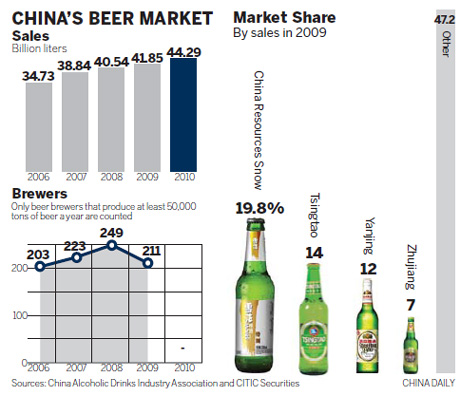On tap
Updated: 2011-03-25 10:39
By Lian Mo (China Daily European Weekly)
Wang Renrong, deputy president of AB InBev Asia Pacific, says AB InBev has already invested more than $3 billion (2.12 billion euros) in China and has 33 breweries here.
AB InBev has also signed agreements with Yingkou, Liaoning province, in January and Xinxiang, Central China's Henan province, in November, to build new breweries with a total investment of 5.2 billion yuan (560 million euros).
"Foreign brewers normally have better brand images, stronger financial backing and more efficient working styles than domestic ones," says Joy Huang, analyst of Euromonitor.
"But they lack distribution channels and production facilities in China.
"Foreign brewers concentrated on premium beers in the past, but more than 85 percent of the beer sales were from 'economy brands' in China."
Euromonitor considers many aspects to classify beers, including brand image and brewery location, but generally it regards beer costing lower than 7 yuan (0.76 euros) per liter as "economy" products.
"To get rid of the limitation to premium beers and grab bigger share, several main foreign brewers have purchased or launched regional standard and economy beer brands to explore distribution channels and increase their production capability," she says.
To that effect, Danish brewing giant Carlsberg bought a 12.25 percent share of Chongqing Brewery Co in November with 2.39 billion yuan, which is 8.6 percent higher than the market price, and became the leading shareholder of Chongqing Brewery with 29.71 percent shares.
"Of all the growth in the global beer market over the next five years, the majority will come from Asia and particularly China," Jorn Jensen, chief financial office of Carlsberg, was quoted by the Financial Times as saying.
"We want to expand our platform in Asia and we're particularly looking at China and Indo-China."
Molson Coors, which has operations in the UK, also paid $40 million to establish a joint venture with Sihai Beer Co in Northeast China and acquired its controlling stake in May.
Kandy Anand, president of Molson Coors International, views China as one of the prime expansion markets in the world for Coors Light, its flagship brand.
He told The Denver Post: "We want to select attractive markets where we can make an impact and China is clearly our focus area.
|
|
"The growth strategy is to make a relatively modest initial investment in brewing capacity at one facility and then expand as sales grow."
Zhang Jinzhi, chairman of Molson Coors China, says Sihai beer's production
facility will push the sales growth of Coors Light to 50 percent from the present 35 percent.
Heineken-APB (China) Pte Ltd, in which Asia Pacific Breweries Ltd holds a 50 percent interest, also has several premium beer brands in China, including Heineken and Anchor.
But the company decided to launch economy brand Anchor Shun Shuang in Guangzhou, South China's Guangdong province, through its subsidiary Guangzhou Asia Pacific Brewery Co Ltd at the end of 2009.
"The sales of Anchor Shun Shuang have so far exceeded our expectations," says Melvyn Ng, general manager of Guangzhou Asia Pacific Brewery.
"It is a mainstream offering in the Anchor family and plays a pivotal role in improving our portfolio that also comprises internationally renowned brands."
"Freshness is the most important quality of beers, so the local producers are likely to monopolize the
market," He Yong, of the China Alcoholic Drinks Industry Association, says.
That is also why the Chinese beer market has seen so many acquisitions and new projects, with breweries needing production facilities at local areas, he says.
"However, after the years of
mergers and acquisitions, there are not many resources left in the industry it may be harder to grab beer market share in future," he says.
E-paper

Pearl paradise
Dreams of a 'crazy' man turned out to be a real pearler for city
Literary beacon
Venice of china
Up to the mark
Specials

Power of profit
Western companies can learn from management practices of firms in emerging economies

Foreign-friendly skies
About a year ago, 48-year-old Roy Weinberg gave up his job with US Airways, moved to Shanghai and became a captain for China's Spring Airlines.

Plows, tough guys and real men
在这个时代,怎样才"够男人"? On the character "Man"

